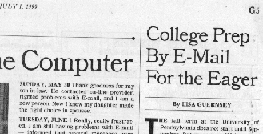
New York Times
College Prep by E-Mail for the Eager
July 1, 1999
By LISA GUERNSEY
The fall term at the University of Pennsylvania does not start until September. But more than 200 incoming freshmen have already met some professors, debated politics and discussed the meaning of poetry -- all by e-mail.
Their correspondence is part of an electronic seminar program that the university began this spring. Al Filreis, a professor of English, and James O'Donnell, a professor of classics, dreamed up the idea for the noncredit orientation seminars last year as a way to stimulate students while they are in the academic nether world between high school and college.
"I've always thought it was a time
intellectually wasted for the
universities," Dr. Filreis said. "We
 admit the students, and then we sit
there until September, sending them
catalogues and things."
admit the students, and then we sit
there until September, sending them
catalogues and things."
Now, instead of being bombarded with glossy brochures and course catalogues, students are being flooded with e-mail. Five seminars are in progress, each one with a professor, an academic dean and 25 students who were selected for the electronic mailing list after demonstrating their enthusiasm for the program in short essays. In Dr. Filreis's seminar, participants have received as many as eight messages a day.
The program is one example of how colleges are using technology to reach students before they set foot on campus. Loyola Marymount University in Los Angeles decided to distribute pagers to incoming students this summer so administrators could send them messages about housing deadlines and course schedules. The University of California at Berkeley and other colleges have carved out space on their Web sites for entering freshmen to exchange information.
At Penn, the students in Dr. Filreis's seminar have not only introduced themselves, but have also become engaged in heated debates over the meaning of grades, the downsides of cramming and the actions of the Chinese Government (one of the students is from Shanghai, and her perspective has been of great interest). They have also sought advice from Dr. Filreis about signing up for courses, getting to know faculty members and analyzing poetry.
Dr. Filreis said the discussions should give the students a focused sense of how college works before they arrive. That was his experience with the 33 students he met through last year's trial run. "I dare say they made the adjustment to college better than the average bear," he said.
Document URL:
http://www.writing.upenn.edu/~afilreis/nyt-2003.html
Last
modified: Friday, 06-Aug-2004 09:59:20 EDT